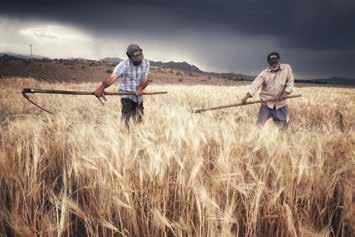
2 minute read
Contemporary Iranian Cinema
Ongoing Series Contemporary Iranian Cinema
Accomplished new films from Iran are in the spotlight in this monthly showcase presented by The Cinematheque in partnership with the Phoenix Cultural Centre of Toronto and Pacific United Productions, a Vancouver-based motion picture production and distribution company.
Advertisement
November 14 (Monday) November 20 (Sunday) 6:30 pm 4:00 pm
Landless
نامتشین ێب Iraq/Syria 2021 Touraj Aslaniw 77 min. DCP
A refugee escape thriller filtered through the prisms of pop music, motherhood, and war iconography, Touraj Aslani’s third feature is an ambitious piece of filmmaking set around the Syrian-Iraqi border. After a violent incursion by Daesh soldiers, musician couple Kani and Hawre, already preparing for the trials of first-time parenthood, set out for Turkey and, they hope, safety. Aslani is most well-known for his award-winning work as cinematographer for two Bahman Ghobadi films (No One Knows About Persian Cats, Rhino Season). But the highest personal stakes for Landless might be found in lead actress Hani Mojtahedy’s story. Just four years into her career, Mojtahedy left her home country of Iran and its restrictions on public performances behind, not knowing if she could ever return. This initial voyage came with a sacrifice: her two children could not join her. Here that story is reconfigured, where Kani’s pregnancy motivates her emigration. In Kurdish, Turkish, Arabic, and Farsi with English subtitles. December 12 (Monday) December 18 (Sunday) 6:30 pm 4:00 pm

Surviving Fortress
رارقرب ى هعلق Iran 2021 Farshad Fadaian 52 min. DCP
As a documentarian, Farshad Fadaian has always been interested in the construction of what we consider civilization. In his latest work, he embeds his practice at a farm over 100 kilometers south of Tehran, one entirely surrounded by desert. If not for the stubborn work, both below and above ground, of one family, their homestead simply would not exist. From the clearing of a qanat to the gathering of harvest, Fadaian pushes his images of a family engaged in near-quixotic work toward both modern and mythic directions. At the age of 75, Fadaian continues to create what writer and historian Hamid Naficy calls “sensitively rendered” films, which are equally concerned with a poetic and ethnographic treatment of labour. Fadaian began his filmmaking career, after a degree in philosophy, with Stone, the Silent Mother (1988), which screened this summer as part of our “Iranian Experimental Film” program.







